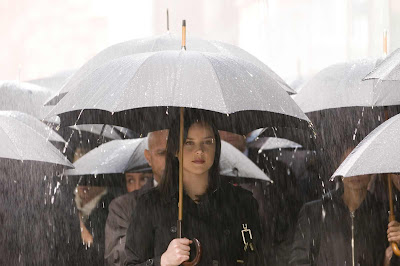Abbie Cornish, from "Sucker Punch" to "W.E." (Opens Sept 12)
Catapulted to fame with a breakthrough performance in the blockbuster “Sucker Punch,” Abbie Cornish now stars in The Weinstein Company's elegant romantic drama “W.E.,” Madonna's vision of one of the most greatest real love stories of all time. The will be shown exclusively at Ayala Malls Cinemas (Glorietta 4, Greenbelt 3 and Trinoma) starting Sept. 12.
“W.E.” starts in the year 1998, when Manhattan is abuzz with anticipation about the upcoming auction of the estate of the Duke and Duchess of Windsor. But the auction is far more than a diversion for Wally Winthrop (Cornish), a New Yorker trapped in an unhappy and abusive marriage. Transfixed by the exquisite artifacts of the Windsors' lives, Wally becomes obsessed with the love story of Wallis Simpson (Andrea Riseborough), the chic, charismatic American who captured the heart of King Edward VIII (James D'Arcy). As she learns more about the sacrifices Wallis made in choosing to be with Edward, Wally finds the courage to follow her own heart and create her own happiness.
The auction became a key narrative device in “W.E.” as Wally, visiting the auction in a bid to understand more about what she thinks is the greatest love story of the 20th Century, “meets” Wallis and learns about the realities of her life. Through various objects – some everyday (a martini shaker, linen tablecloths), some precious (a Cartier bracelet) – Wallis’s life unfolds before Wally’s eyes. Each item tells a story, and it is through Wally’s handling of each item that we are able to go back and forth in time and learn about Wallis.
Madonna says, “Wally starts off her journey, longing for a loving relationship, because she is deeply unhappy. It was important for me to create a character who was trapped in a relationship that was not rooted in love and to have her pining for the idea of romantic love.”
The casting of Wally required an actress with the sensitivity to convey a myriad of different emotions alongside Wally’s vulnerability. Says Madonna, “Wally doesn’t really have a voice; she lives vicariously through objects and through the Duchess. There is a quietness about her and that is why I wanted to cast Abbie. She has a strength about her as an actress when she doesn’t say anything. There is a weight and a sadness in that silence.”
Wally’s obsession leads her to question her own unhappy marriage with William Winthrop (Richard Coyle) and allows her to open her heart to a new romance with Evgeni (Oscar Isaac). Madonna comments, “The relationship between Evgeni and Wally is about to begin at the end of the film. We don’t know what compromises they will make, but one thing Wally knows as a result of her journey is that there is no such thing as perfect love, and we all have to make compromises to make a relationship work.”
Cornish explains her passion for the role: “I felt a strong connection to Wally and to her journey. I thought the parallel connection story with Wallis, mixing fiction with non-fiction was really interesting. The subject matter excited me. When I read the script, Wally bounced off the page and got under my skin. She was so full. And then there was the creative team. The idea of making a film with Madonna was exciting. I was interested to see what she would do with this film and what it would be like to collaborate with her”.
When Cornish was preparing for her role, Madonna carefully ensured she had the right research material to study. “Madonna and I had a lot of exchanges particularly on email, about who Wally was, what the film is about, what it means to make it and how to access her. She provided a lot of research material and sent me a whole bunch of books on Wallis, her autobiography, and as my character is into art, she sent me books on Lee Miller, Tamara de Lempicka, Frida Kahlo and just inundated me with all this information and said, ‘Here’s Wally, she’s in here, read this.’" Madonna also forwarded Cornish the following passage from F. Scott Fitzgerald’s Tender is the Night:
“She had somehow given over the thinking to him and in his absences her every action seemed automatically governed by what he would like. So that now she felt inadequate to match her intentions against his. Yet think she must, she knew at last the number of the dreadful door of fantasy. The threshold to the escape that was no escape. She knew that the greatest sin now and for the future was to delude herself. It had been a long lesson but she had learnt it. Either you think, or else others have to think for you, and take the power from you. Pervert and discipline your natural tastes. Civilize and sterilize you.”
Fitzgerald’s description gave Cornish further insight into Wally’s inner life, Cornish affirms. “It summed up Wally’s journey, and in particular, what she’s going through in her marriage.”














Comments
Post a Comment